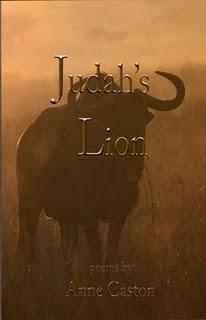Judah's Lion

I was a bit wary when I received Judah's Lion. Its title and that of many of its poems made clear to me that we were going to be talking about The Almighty, and not in a sort of New Age everything-is-divine kind of way; I’m talking about Old Testament smiting and personal conversations. As a member of the liberal elite who often chuckles evilly as she writes, I had a hard time getting into it at first. Cruddy, I thought, throwing it down. I’ve wasted a good poetry pick on a nurse who writes about Jesus.
The second time I picked it up, I read it straight through and loved it. This change of heart of manifested as an activation of latent Catholicism. No, I haven’t forgotten what il papa said about contraception. I’m referring to a visceral appreciation of spectacle, and more specifically, carnage.
University of Alaska Anchorage professor Anne Caston is, at best, ambivalent toward G-d, despite biblical allusions a-plenty (don’t worry, there are endnotes). He is depicted alternately as Craftsman, Potter, and One-Who-Has-Torn-and-Departed. Caston’s characters are angry, half-formed, and ill, but He doesn’t stick around to fix what invariably breaks once creation has been set in motion. Her poetry, written in deceptively simple language, captures particularly well the disgusting beauty of hospital work, of the futile attempts to give a moment of happiness to those whose lives are on the verge of snapping.
She opens with a poem called “What Seems To Be” and questions her authority as observer and writer throughout the text. How dare she claim and record experiences that also belong to others? The first section, “Judah’s Lion,” focuses on a son who shares his mother’s madness and her gift for poetry, despite his literal bent. The City of God, he claims, is near Stone Mountain, Georgia. “The Story I Sometimes Tell Myself” is a personal mythology; its poems follow the growing-up of a woman and two doomed marriages: one wherein she loves something that will destroy itself and another that she loves after it is gone. The final section, “The Gathering House,” is a house of death: manifold, gruesome, heartbreaking.
The combined force is that of a life where suffering is without end, yet this is not a sad book. In the end it is, I think, a book about love. Her “Last Psalm” celebrates “what I have loved in this life/ the blossoming branch and the locust horde/ the beauty each is, and the terror.”